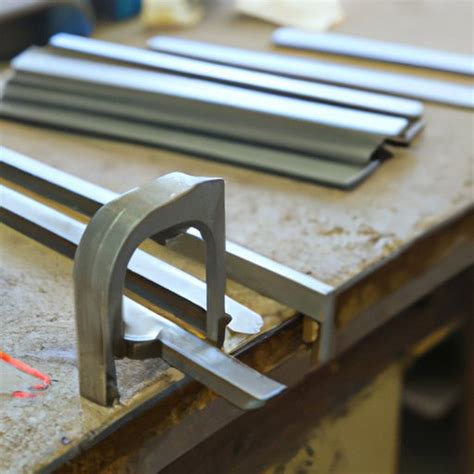How To Bend Aluminium Flat Bar
Ronan Farrow
Mar 23, 2025 · 3 min read

Table of Contents
How to Bend Aluminum Flat Bar: A Comprehensive Guide
Aluminum flat bar is a versatile material used in various applications, from DIY projects to industrial manufacturing. Knowing how to bend it correctly is crucial for achieving desired shapes and ensuring structural integrity. This guide provides a step-by-step approach to bending aluminum flat bar effectively, covering different methods and crucial considerations.
Understanding Aluminum's Properties
Before diving into bending techniques, it's essential to understand aluminum's properties:
- Soft and Malleable: Aluminum is relatively soft, making it easier to bend than steel. However, this also means it's susceptible to work hardening (becoming harder and more brittle with repeated bending).
- Work Hardening: To prevent cracking, it's important to use appropriate bending techniques and potentially anneal the aluminum after significant bending to soften it again.
- Springback: Aluminum will experience springback after bending, meaning it will partially return to its original shape. Account for this by over-bending slightly.
Choosing the Right Bending Method
The best bending method depends on several factors, including the thickness of the aluminum flat bar, the desired bend radius, and the available tools. Here are some popular options:
1. Hand Bending (For Thinner Bars):
- Suitable for: Thin aluminum flat bars (under 1/8" thick).
- Tools: A sturdy workbench, a bending jig (optional, but highly recommended for consistent bends), and possibly a mallet or hammer.
- Technique: Place the bar on the workbench or jig, and apply consistent pressure to create the desired bend. Use slow, controlled movements to avoid kinking or cracking.
2. Using a Vise (For Moderate Thickness):
- Suitable for: Aluminum flat bars of moderate thickness (up to 1/4" thick).
- Tools: A sturdy vise, a mallet or hammer, and possibly a soft jaw insert to protect the aluminum surface.
- Technique: Secure a portion of the aluminum bar in the vise, leaving the portion to be bent free. Apply gradual pressure with the mallet or hammer to bend the bar to the desired angle.
3. Utilizing a Bending Brake (For Thicker Bars and Precise Bends):
- Suitable for: Thicker aluminum flat bars and when precise bends are required.
- Tools: A bending brake, which is a specialized tool designed for precise bending of metal sheets and bars.
- Technique: The aluminum bar is clamped into the bending brake, and a lever or hydraulic system is used to create the bend. Bending brakes allow for accurate control over the bend angle and radius.
4. Employing a Press Brake (For Large-Scale Bending):
- Suitable for: High-volume production and bending of thicker or larger aluminum flat bars.
- Tools: A press brake, which is an industrial machine using a hydraulic ram to bend metal.
- Technique: The aluminum bar is positioned in the press brake according to the desired bend, and the machine completes the process precisely and efficiently.
Essential Tips for Successful Bending
- Preparation is key: Measure and mark your aluminum bar accurately before bending to ensure precise results.
- Support the bar: Adequate support during bending is essential to prevent warping and damage.
- Lubrication: Using a lubricant (like soap or WD-40) can reduce friction and make bending easier.
- Gradual bending: Avoid applying sudden or excessive force. Gradual, controlled bending prevents cracking and ensures a clean bend.
- Annealing: For multiple bends or thicker aluminum, consider annealing the material to soften it and prevent work hardening.
- Springback compensation: Over-bend slightly to account for springback after the bending process.
Safety Precautions
- Always wear safety glasses: Protecting your eyes from flying debris is essential.
- Use appropriate gloves: Gloves provide better grip and protect your hands.
- Work in a well-ventilated area: Some lubricants may release fumes.
By following these guidelines, you can successfully bend aluminum flat bar for your projects, whether you're a DIY enthusiast or a professional fabricator. Remember that practice makes perfect, so start with smaller projects and gradually work your way up to more complex bends. Choosing the right method and using appropriate tools will significantly increase your success rate and ensure the integrity of your finished product.
Featured Posts
Also read the following articles
| Article Title | Date |
|---|---|
| How Much Is Emmitt Smith Football Card Worth | Mar 23, 2025 |
| How Much Is Travis Pastrana Worth | Mar 23, 2025 |
| How To Apply For Free Tablet From Government 2024 | Mar 23, 2025 |
| How Much To Fix A Fender Bender | Mar 23, 2025 |
| How To Answer What Is Your Relationship With God | Mar 23, 2025 |
Latest Posts
-
How Long Does It Take To Smoke Baked Beans
Apr 05, 2025
-
How Long Does It Take To Ship A Vehicle
Apr 05, 2025
-
How Long Does It Take To Shingle A Roof
Apr 05, 2025
-
How Long Does It Take To Settle Wrongful Death Claims
Apr 05, 2025
-
How Long Does It Take To See Results With Braces
Apr 05, 2025
Thank you for visiting our website which covers about How To Bend Aluminium Flat Bar . We hope the information provided has been useful to you. Feel free to contact us if you have any questions or need further assistance. See you next time and don't miss to bookmark.
